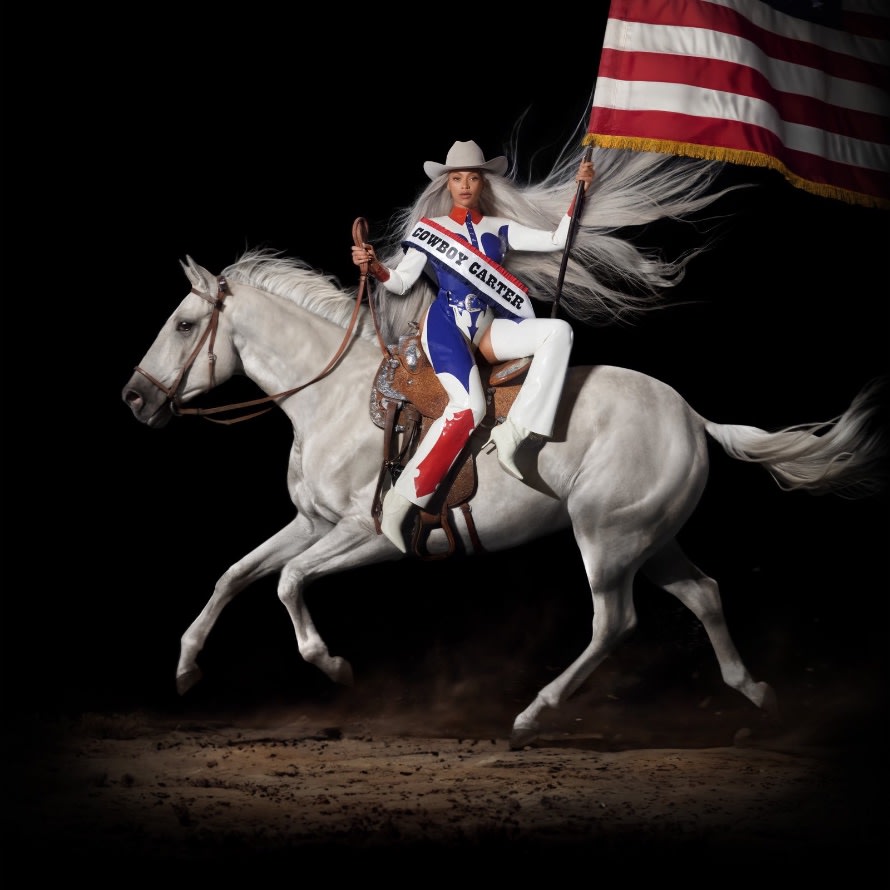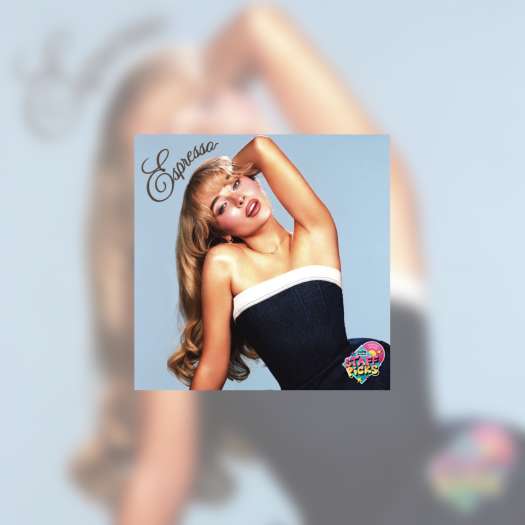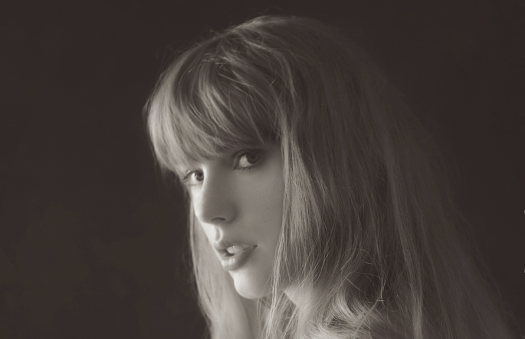Nobody puts Beyoncé in a corner — It's a lesson the gatekeepers of country music learned the hard way this past weekend. Inspired by the Houston native's cold reception at the 2016 Country Music Association Awards, COWBOY CARTER — the follow-up to 2022's dancefloor fantasia RENAISSANCE — is an epic claimstake of an album, a sprawling ode to Beyoncé's Southern roots and the vast history of Black American country music.
Since announcing the album in February of this year, Beyoncé has faced backlash for her decision to venture into the genre, with some radio stations refusing to play her singles and many (misguided) country music traditionalists accusing her of leeching from a sound and culture that's not her own. Across COWBOY CARTER's monumental 27 tracks, she makes a meal out of these critics, stitching together the genre's past and present while carving out its future too. In a post on Instagram prior to the album's drop, Beyoncé wrote: "This ain't a Country album. This is a 'Beyoncé' album." Few artists can make proclamations like these without incurring a little skepticism, but when Beyoncé says it, you believe her.
Her immaculate attention to detail, her pristine sense of her research and homage, her unparalleled (in both scope and budget) artistic vision — Beyoncé is operating at a level all her own on COWBOY CARTER, and the result is a grandiose and unwieldy fuck you to any who would doubt her bonafides. The way she engages with the material on COWBOY CARTER is fluid and ever-evolving; she thinks critically about her message and finds ways to educate others within its margins. Her work is an immersive experience from start to finish, meticulously crafted so that no one piece is greater than the whole.
It's no secret that the modern country music industry is insular, a little rigid, and very, very white. This isn't to paint all country music with the same brush, but Black artists (and queer artists, and women, and anyone who doesn't fit within the genre's reductive boxes) have long been overlooked and excluded in order to uphold a specific image and set of values. This has galvanized some like the Black Opry, a collective of Black musicians working to reclaim their place in the Americana musical canon, and exhausted allies like Maren Morris, a five time Academy of Country Music Award winner who made the decision to leave Music City's toxic scene due to "people's bad behaviours." (Morris, it should be noted, commented, "Drag them, Queen" under Beyoncé's COWBOY CARTER Instagram post.)
In the same way that RENAISSANCE celebrated the contributions of Black artists to dance and house music, COWBOY CARTER pays tribute to country music's Black roots. Notably, Beyoncé gives Linda Martell — the first solo Black woman to play the Grand Ole Opry, known for her own genre-bending blend of R&B, gospel and country — her long overdue and well-deserved flowers. Martell released her debut album Color Me Country in 1970, but the apathy and vitriol she faced from both the industry and audiences forced an early end to her promising career. The intro to "SPAGHETTII" features a clip of Martell musing on genre: "In theory, they may have a simple definition that's easy to understand. But in practice, well, some may feel confined." Confinement is an apt word, both in the context of Black artists being sidelined to the margins of history and the shallow understanding of genre that has proliferated the stale parameters of so much popular music. To that end, Beyoncé finds ways of circumventing tradition to blend old and new. She features contemporary Black artists like banjo player Rhiannon Giddens ("TEXAS HOLD 'EM"), songwriters Tanner Adell, Brittney Spencer, Tiera Kennedy and Reyna Roberts ("BLACKBIIRD"), steel guitarist Robert Randolph ("16 CARRIAGES") and rapper Shaboozey ("SWEET HONEY BUCKIIN'"), curating an impressive array of talent to showcase to a broader audience.
Other high–profile guest appearances include legendary icons like Willie Nelson and Dolly Parton, whose involvement is a stamp of approval in and of itself. It's no coincidence that Nelson's interlude to "JUST FOR FUN" sees him playing a radio host for KNTRY Radio: "Sometimes you don't know what you like / Until someone you trust, turns you on to some real good shit / And that, ladies and gentlemen, is why I'm here." Nelson and Parton are veteran arbiters, here to validate and support Beyoncé's endeavours. Miley Cyrus ("II MOST WANTED") and Post Malone ("LEVII'S JEANS") also lend their talents capturing even more crossover potential between genres and audiences. Queen Bey's tent expands to fit everyone; it's an inclusive call to action missing from so much popular country today.
Beyoncé blends elements of folk, pop, trap, hip-hop, country and even opera (she interpolates "Caro Mio Ben" on "DAUGHTER"), showcasing her omnivorous versatility and further expanding the borders of what modern country can be. Her cover of the Beatles' "Blackbird" is lush with harmonies, her imperious version of Dolly Parton's "Jolene" inspired. In perhaps the record's most obvious bit of self-mythologizing, she even addresses her longtime Grammys shit-out for Album of the Year. "A-O-T-Y, I ain't win / I ain't stuntin' 'bout them / Take that shit on the chin / Come back and fuck up the pen," she raps on "SWEET HONEY BUCKIIN." Consider the pen fucked up — it turns out this town is more than big enough for Honey B.
The day COWBOY CARTER dropped, Questlove made a plea to fans and critics alike to live with the record first before offering their hot takes. He was right to ask for patience — COWBOY CARTER deserves your full attention; its sprawl unsuited for TikTok-sized consumption habits. Clocking in at just under 80 minutes, it takes time to properly digest, a rich 27-course meal that dares one to really let it sit on the tongue. "It feels good to see how music can unite so many people around the world, while also amplifying the voices of some of the people who have dedicated so much of their lives educating on our musical history," Beyoncé wrote of her latest opus — her triumph is in how COWBOY CARTER will be shared, opening new spaces for fresh voices and for those that have always been there. Yee-haw to that.




